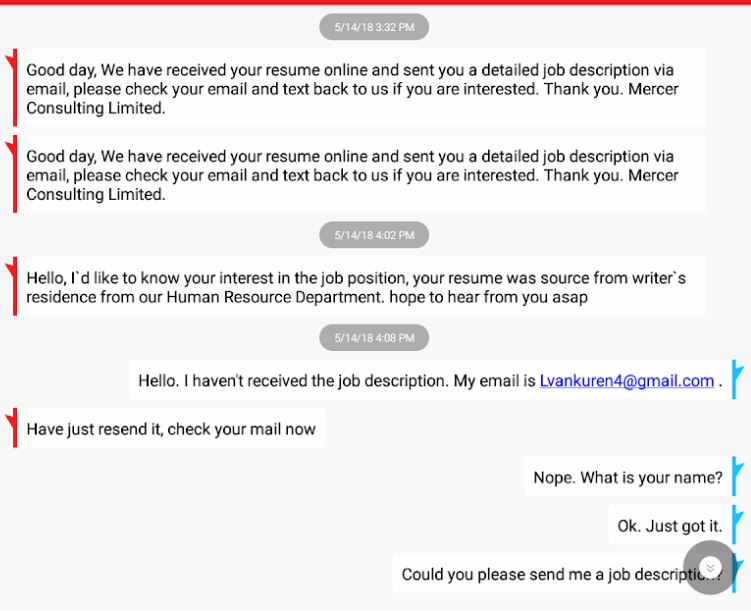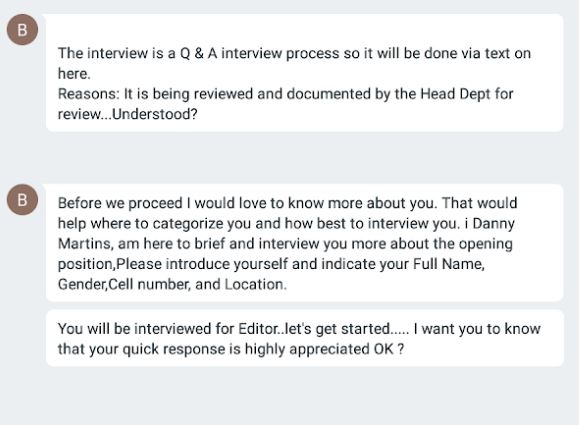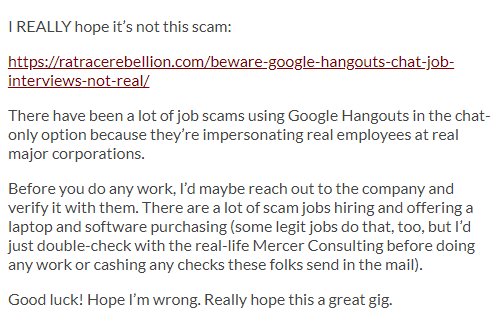Want to make money from home as a freelance writer?
That’s the goal, right? Work in your pajamas. Be your own boss. Make your own schedule.
Being a freelance writer is a great career and lifestyle, but it’s also hard work. And scammers know it.
If you have a writer website or social presence as a freelance writer, prospects aren’t the only people checking you out. Scammers are sifting through the same information in search of freelancers who are looking to write articles for money.
You might think you’re too savvy to fall for the cash-this-fake-check and bankwire-transfer scam, but at least one scammer has developed a clever way to lure writers in with big promises, drain bank accounts and disappear.
Think it couldn’t happen to you? Don’t be too sure.
I thought I was pretty immune to “make money from home” scams, but I almost fell for this one.
Here’s what happened:

Are you a scammer’s ideal client?
If you’ve posted your resume on job boards or built a writer website that includes your phone number, email address, and other contact info, you’re a target for this make money from home scam.
Here’s how it works:
- An imposter recruiter contacts you about contract work
- It looks like they work for a reputable and established company
- The recruiter sets up an interview with you to discuss the gig
- You get hired. And then you’re supposed to follow a specific set of instructions to start getting paid
But it’s all part of a sophisticated make money from home scam aimed at freelance writers. And I don’t want you to be next. Fall for a scam like this, and the average victim loses about $1,000, according to the Better Business Bureau. Here’s what this scam looks like.
The clever “make money from home” come-on
It started with an unexpected text from Mr. Oliver Wyman of Mercer Consulting Unlimited. He’d “received my resume online. ” But I didn’t submit one. When I asked about this, he said he learned about me from my writer website and wanted to know if I was interested in an online editor position.

Contract work + benefits
Write and edit content for this talent recruiting firm. The pay was good, but not so high it put me on alert: $45 an hour, $25 an hour for training. I’d be expected to work a minimum of two hours a day at my convenience. And, though I was a contract employee, I’d get health insurance and paid time off.
Google it
I Googled the company and learned it was a reputable corporation. Excited that I’d attracted a potential client with my website and the possibility of steady income, insurance, and vacation pay, I ignored my gut’s frantic signals and agreed to an interview.
An unconventional interview
To my surprise, the interview was to be done on Google Hangouts. Having been out of the job market a while, I thought this might be the procedure these days and agreed.

Within 10 minutes, I was being interviewed via Google Hangouts Chat, “so my answers could be reviewed and documented.”
What about writing and editing skills?
The questions were standard first-interview questions. I noticed they didn’t ask much about my editing experience but decided those questions would be addressed in a second, face-to-face interview.
You’re hired…but first there’s a few things you need to do
The next morning I woke to the news: I was hired! Mr. Wyman told me via text message the company would provide me with software and a new Apple laptop. I was to buy the materials from a specific vendor the company worked with.
The old cash-this-fake-check scam
Mercer Consulting would send me a check to cover the cost. At that point, Mr. Wyman wanted to know the name of my bank to ensure they had an agreement with it. Then he asked for my address.
Gut check and Den help
Finally, my gut got through, and I turned to the Freelance Writers Den for help. Here’s what freelance writer Kaitlin Morrison said:

Following Kaitlin’s advice, I contacted the folks at Mercer Consulting who confirmed this was a scam, and I bailed.
Had I continued, I would’ve received a fraudulent check to deposit, using mobile banking or an ATM, in my account. Then I would’ve been instructed to wire most of that money to the “vendor” immediately. In a few days, the check would’ve bounced, and I’d be $1,000 or so poorer.
How to spot a freelance writing scam
If a prospect you’ve never heard of reaches out with contract work they need help with, it might be a legit lead and potential client. If it is, it’s a sign your inbound marketing efforts are working. But if it isn’t, it might be a scam like this. Here’s how to avoid being Mr. Wyman’s next victim:
- Trust your gut. If your gut’s queasy, take heed. Look up the company and see if the job is posted on its website or contact human resources
- Don’t buy equipment. Legitimate companies provide any equipment you need to do the job.
- Never wire money. Asking you to wire money is a sure sign of a scam
- Nix Google Hangouts interviews. Reputable companies don’t use informal sites such as Google Hangouts, and especially not the chat option, for interviews
- Examine correspondence. Any email you get from a recruiter should be from the company’s account. If that seems to be the case, test it. Scammers often use emails that resemble a real company’s address: @dukeenergy.com instead of @duke-energy.com. Also, any correspondence with grammar, punctuation, and syntax errors is suspect
- Only deposit checks that you know are from legitimate organizations. Many of the checks scammers use look real. If in doubt, call your bank
- Protect your financial and personal information. There’s no reason for recruiters to ask for your social security number, bank account access, PayPal password, or credit card information. Keep this information private
- Report it. If you are the target of a scam, report it to the Federal Trade Commission, your state attorney general, or the Better Business Bureau
If you’re struggling to land client work, getting an out-of-the-blue offer may sound pretty good. And it may pan out. But do your homework, first. Pay attention to the warning signs of scams like this to avoid becoming a victim. If it sounds too good to be true, it probably is.

Lynda Van Kuren is a freelancer who specializes in writing about education, health and fitness.










